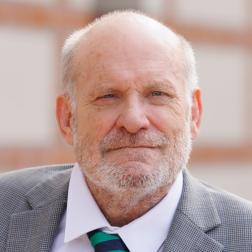
Table of Contents
Author(s)
Share this Publication
- Print This Publication
- Cite This Publication Copy Citation
Joe Barnes, "Foreign Policy Roundup: The 2024 Democrats" (Houston: Rice University’s Baker Institute for Public Policy, August 8, 2023).
The 2024 presidential election is still over a year away, with Iowa Republicans’ first-in-the-nation caucus not hosted until January. But the race is warming up — and we can already glean some preliminary information on where the candidates stand on foreign policy.
On the Republican side, more than a dozen candidates, including former President Donald Trump, are vying for the nomination. Current polling shows Trump trouncing his leading opponent, Florida Gov. Ron DeSantis. On the Democratic side, President Joe Biden faces challenges from self-help author Marianne Williamson and Robert F. Kennedy Jr., an anti-vaccine activist and a member of one of the country’s most famous political families. Among them, Biden is considered the prohibitive favorite.
Most voters have hardly begun to focus on the 2024 election — and perhaps rightly so. A great deal can happen between now and Election Day. In addition to the usual economic and political uncertainties, two major unanswered questions will shape next year’s election. The first is how the unprecedented legal problems confronting Trump, who faces at least three trials for various offenses, will affect his candidacy. The second question is Biden’s health. He is 80 and already the oldest president in U.S. history.
Foreign policy is unlikely to play a decisive role in the 2024 election — elections tend to be driven by domestic issues, particularly economic ones. Next year’s election is probably going to be the same. Still, foreign policy will be an important issue in the campaign, and should a crisis strike close to Election Day, it could have a substantial impact.
Let’s look at the Democrats, starting with Biden’s challengers.
Few observers believe that Robert F. Kennedy Jr. or Marianne Williamson have any chance of winning the Democratic nomination; Biden is an incumbent and maintains the support of the Democratic Party, inside and outside of Congress. He is already raising substantial campaign funds. By contrast, Kennedy and Williamson are very much fringe candidates, routinely derided as crackpots.
Kennedy, a long-time anti-vaxxer, is a staunch believer in various debunked conspiracy theories. His main claims to fame are genetic — his father was Sen. Robert F. Kennedy and his uncle was President John F. Kennedy. He trades on the dwindling mystique of the Kennedy name. On foreign policy, he is highly critical of Biden’s tough approach toward Russia and China, and believes that the United States bears at least some of blame for the Russia-Ukraine war.
Williamson, meanwhile, ran for the Democratic presidential nomination in 2020, although she dropped out early and endorsed Sen. Bernie Sanders. Her politics are staunchly progressive. Williamson’s signature foreign policy proposal is a “Department of Peace” to promote nonviolent solutions to the world’s problems.
Biden has the clearest and longest foreign policy track record of any of the candidates, Republicans and Democrats alike. It reaches back 50 years through his service as a U.S. senator, vice president, and now, since January 2021, president. While his positions have evolved over the years, they generally conform to traditional liberal internationalism — and, more specifically, the liberal internationalism practiced by the modern Democratic Party. Biden is, above all, a politician, and his foreign policy views are usually found in the “sweet spot” of Democratic Party consensus.
Like most presidents, Biden surely began his term hoping to focus on domestic affairs. And, like most presidents, he discovered that international events would deny him this luxury. His first crisis was the U.S. withdrawal from Afghanistan; while most Americans may have supported ending our presence in that country, many were clearly disturbed by our chaotic evacuation. Biden’s job approval dropped sharply after the withdrawal and has never fully recovered.
Even more consequential than the evacuation from Afghanistan is the ongoing war in Ukraine, an event with vast ramifications for European and, indeed, world security. From the beginning of the conflict, Biden has adopted a strongly pro-Ukrainian stance tempered by caution. While willing to offer Kyiv substantial military, financial, and diplomatic support, he has been very careful to avoid steps that might draw the U.S. and its allies into direct conflict with Russia. To date, there has been broad bipartisan support for Biden’s Ukraine policy. However, there is recent polling that suggests Americans — particularly Republicans — are turning against providing more aid to Kyiv. Should the Russia-Ukraine war grind on, Biden’s position on it could harm him in the 2024 presidential election.
Lastly, U.S. relations with China present another critical foreign policy issue. Here, Biden is again trying to maintain a balancing act. The golden days of U.S.-China cooperation have long since passed, and Biden’s overall policy, reflecting a growing consensus in Washington, takes a firm line toward Beijing. Biden has both maintained Trump’s tariffs on Chinese goods and supported efforts to reduce the global role of the Chinese semiconductor industry through the CHIPS and Science Act, which he signed into law last year. And he has several times stated that the United States would support Taiwan were China to invade. Unsurprisingly, U.S.-China relations are tense. At the same time, Biden wants to keep open diplomatic channels on the many areas — notably the environment — where U.S.-China cooperation is useful.
One thing is, however, certain: Biden the candidate will be criticized by Republicans for being “too soft” toward Beijing. In today’s political environment, there is no downside to being tough on China.
This material may be quoted or reproduced without prior permission, provided appropriate credit is given to the author and Rice University’s Baker Institute for Public Policy. The views expressed herein are those of the individual author(s), and do not necessarily represent the views of Rice University’s Baker Institute for Public Policy.
